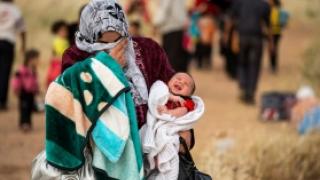
UNA-UK welcomes the Prime Minister’s announcement today that the UK will accept “thousands” more Syrian refugees. However, as the refugee and migrant crisis intensifies across Europe, we urge the British Government to collaborate with other EU states to develop a coherent and rights-based policy to protect all populations fleeing from conflict.
As conflict continues to rage not only across Syria but also Iraq, South Sudan, Mali and elsewhere, the number of migrants and refugees living in makeshift camps on the streets of Calais has risen to between 2,000 and 5,000 in the last year. Yet they account for as little as one per cent of all those who have arrived in Europe so far this year and globally, the world is facing the largest displacement of people since the Second World War.
In the case of Syria, nine million civilians have fled their homes since the outbreak of a devastating civil war in March 2011. While refugees may face poverty, homelessness or even the risk of drowning at sea, staying put carries the daily threat of death. "It is a population that deserves the support of the world but is instead living in dire conditions and sinking deeper into abject poverty," said UN High Commissioner for Refugees António Guterres.
The UK response
On 4 September, Prime Minister David Cameron announced that the UK would be providing resettlement to "thousands" of refugees from UN camps bordering Syria. The Government has not, however, indicated that it will be accepting refugees from other countries, or indeed those who have already travelled across the Mediterranean to seek asylum in Europe.
To date the Government has granted asylum to “around 5,000” Syrian refugees, including some 200 under the UK's programme to resettle the "most vulnerable", launched in 2014. The UK is also the second largest bilateral aid donor in Syria and the surrounding region, providing more than £900m for the humanitarian response.
However, the Special Representative of the UN Secretary-General for International Migration, Peter Sutherland, has previously marked the UK as a country that “can do more” to alleviate the crisis. In 2014, the UK accepted a total of just 10,050 applications for asylum - a stark contrast to Germany (97,275), Sweden (39,905) and Italy (35,180)*. And this pales in comparison with the burden facing countries like Lebanon, which has a population of around 4.5 million and has taken in over 1.3 million Syrian refugees.
Until now, the UK Government’s response to the crisis in Calais has been neglectful of its international legal obligation to protect the human rights of refugees and migrants, instead focusing heavily on preventing those stranded in Calais from entering Britain. Last month, Home Secretary Theresa May reached an agreement with France to create a joint police task force to tackle illegal trafficking. The agreement includes a £22 million investment of UK resources to secure the Eurotunnel.
UNA-UK’s recommendations
While UNA-UK applauds the Government for promising to increase its intake of refugees, we encourage Britain to collaborate with Europe to develop a regional response that reflects the scale and complexity of the global displacement crisis. We also urge the Government to ensure that the rights of individuals who are accepted into the UK are respected and treated with dignity.
UNA-UK believes that in neglecting to work with its European neighbours to provide a lasting solution to the situation, the UK is failing to comply with its international obligations under various human rights treaties. According to the UN Special Rapporteur on the Human Rights of Migrants, François Crépeau:
“Talking about ‘flows’, ‘marauders’, and ‘swarms’ is an unsubtle way of dismissing the legitimacy of the asylum seekers and migrants’ claim to human rights, by creating images linking them to toxic waste or natural disasters… We are talking about men, women, children and even babies, who have faced traumatic experiences. These are people just like you and me, and none of us have the moral high ground to say that we would never do the same if we were in their shoes.”
Mr Crépeau has identified an urgent need for the UK and Europe to work with other Western countries to create a large-scale resettlement programme that could offer protection to 1.5 or 2 million refugees over the next five years.
UNA-UK believes that the UK should:
- Improve the system by which asylum seekers and migrants are processed and registered in the UK so that those fleeing conflict are promptly assigned refugee status
- Resettle more refugees bringing the UK in line with the overwhelming level of support shown by its European neighbours
- Provide migrants and refugees who are accepted into the UK with the essential services they need, and ensure that their rights and dignity are fully upheld
- Lead by example in Europe by working towards an EU-wide and rights-based solution to the crisis
- Work with the UN Security Council to increase the protection of civilians by: improving humanitarian access to conflict zones; publicly condemning regimes that fail to protect their citizens from atrocity crimes; and seeking a political solution to the displacement crisis
*Statistics provides by Eurostat
Photo: A young mother crosses the border from Syria and becomes a refugee. She carries her one-month-old son, Hamid. Copyright UNHCR
Banner photo: Syrian refugees' camp in Cappadocia, Turkey. Copyright Fabio Sola Penna/CC




